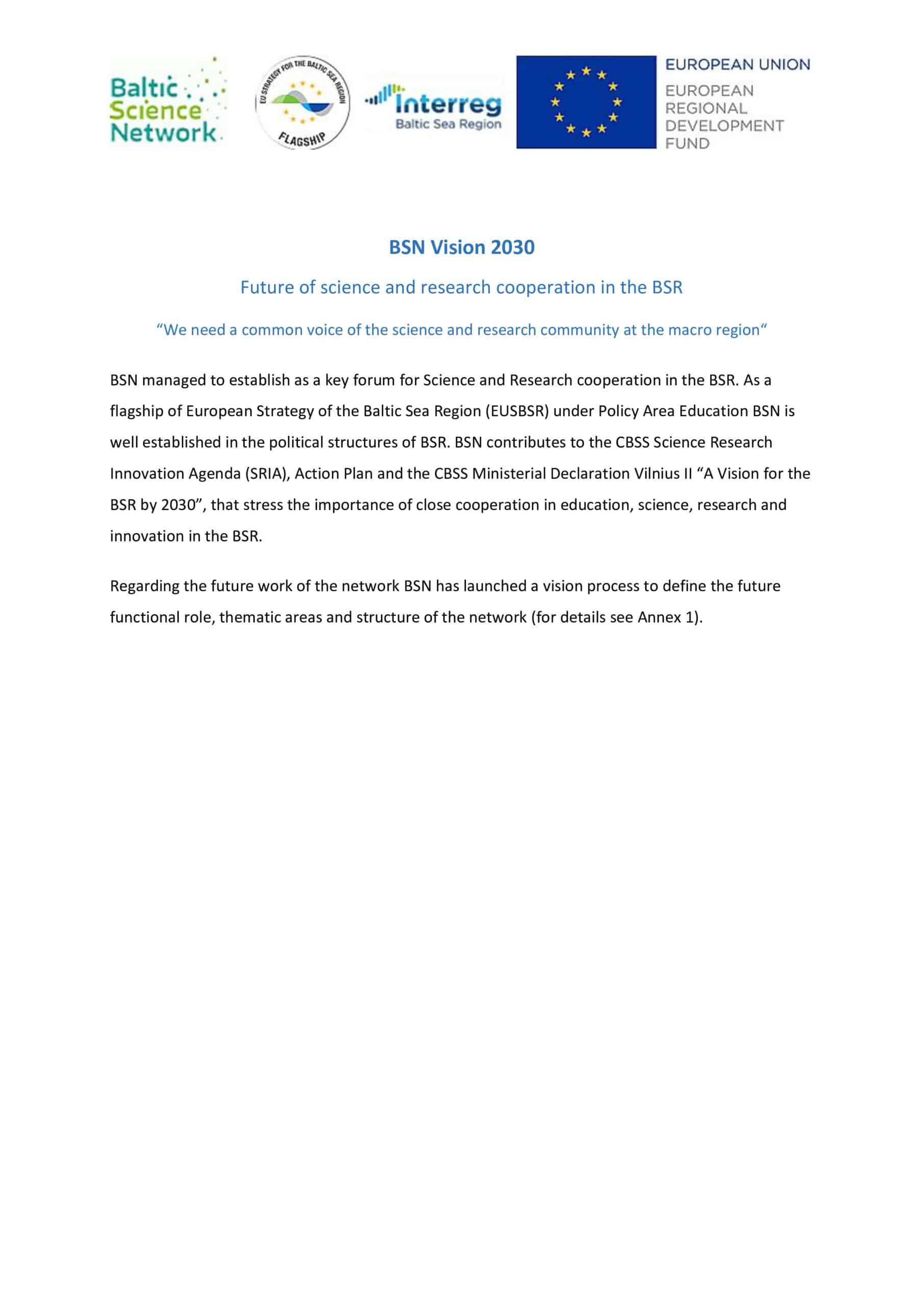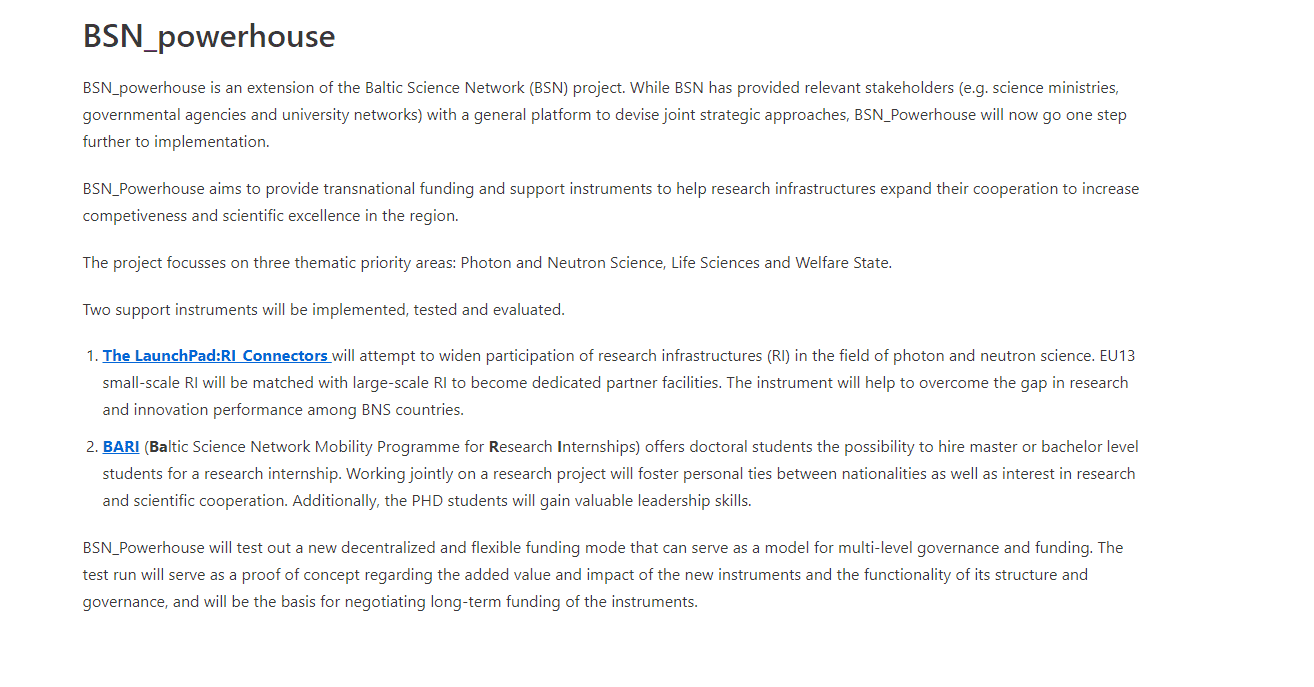BSN_powerhouse
Society expects research and higher education to respond to global challenges, such as climate change, energy and resource efficiency, food supply, welfare, health and demographic change. The countries around the Baltic Sea have an excellent structure of leading universities and research institutions which makes the Baltic Sea region one of the most competitive and innovative science regions in the world. However, not all levels of research and innovation perform equally well across the macro region, the existing facilities are not evenly distributed and not all are well interconnected.
For the time being, science policy around the Baltic Sea is organised mainly from a regional, national or European angle. Yet, national or sub-national answers are not sufficient anymore to respond to global questions, and the European angle is typically too wide to consider the specific features of every single country. A macro regional dimension in science policy could be the right scale to respond to the challenges of society. This would require a joint approach of the countries surrounding the Baltic Sea towards higher education and research and more cooperation in research and higher education. However, there is a lack of political ownership of such a macro-regional dimension of science policy
The preceding project Baltic Science Network (BSN) provided science ministries, funding agencies and university networks with a platform to discuss joint approaches. The main objective of the follow-up, BSN_powerhouse, is to help ministries and agencies to design transnational support programmes in three research fields: photon and neutron science, life sciences and a welfare state.
Budgets
in numbers
-
1.09MillionTotal
-
0.73MillionErdf
-
0.13MillionEni + Russia
-
0.00MillionNorway
Achievements
The project gathered regional and national ministries in science, research, education and innovation, which are now able to cooperate at the macro-regional level. As the project proved that there is a need among research institutions and higher education institutions to get support for engaging in transnational cooperation, BSN_powerhouse has implemented, tested and evaluated two support instruments: LaunchPad and BARI.
LaunchPad as a support tool has been introduced.
The first support instrument is the LaunchPad: RI Connectors, or the action tool for research infrastructures (e.g., MAXIV, DESY, European XFEL, CERN) and their users. The national ministries of education of Estonia, Lithuania and Latvia, the ministry of science of the city of Hamburg as well as some universities (e.g. University of Gdansk) are continuing the cooperation in a newly established workshop series "BSN to Widening". The aim is to utilise the experiences and recommendations from the LaunchPad test phase in the context of the Horizon Europe Widening programme.
The tool has been particularly effective to widen the participation of research infrastructures in the field of photon and neutron science. LaunchPad aims to connect small-scale and large-scale research infrastructures and initiate collaboration among researchers from different research infrastructures and research areas. This instrument contributes to closing the gap between EU13 (member states that joined the EU in and after 2004) and EU15 (members that joined the EU before 2004) in the participation in funding opportunities, such as Horizon 2020.
The BARI mobility programme.
The second instrument is called BARI (Baltic Science Network Mobility Programme for Research Internships). It offers doctoral students the possibility to hire master- or bachelor-level students for a research internship. Working jointly on a research project has fostered personal ties between nationalities, as well as interest in research and scientific cooperation. The BARI instrument mobilised 158 applicants in 12 calls for applications, 182 internship offers from 72 universities and research institutions. As a follow-up to the mobility programme, the project partners established Research Internship Market where students have the possibility to find internship offers, while PhD candidates get help from interns for their research projects.
Both instruments have contributed to overcoming the gap in research and innovation performance among the countries across the Baltic Sea region. Furthermore, the support tools helped to set an environment where a more balanced brain circulation prevails throughout the region. They also contributed to putting macro-regional science policy on the agenda and disseminating project results at regional, national and EU levels.
Outputs
Sustainable funding for Widening Participation Support Action and Mobility Programme.

Two support tools: LaunchPad and BARI

Project Stories
Partners
Free and Hanseatic City of Hamburg - Ministry of Science, Research, Equalities and Districts
- TownHamburg
- RegionHamburg
- CountryGermany
- RepresentativeJulia Gottwald
- Phone
- E-Mail
- Web
Ministry of Education and Research of Republic of Estonia
- TownTartu
- RegionLõuna-Eesti
- CountryEstonia
- RepresentativeKatrin Pihor
- Phone
- E-Mail
- Web
Ministry of Education, Science and Sport of the Republic of Lithuania
- TownVilnius
- RegionVilniaus apskritis
- CountryLithuania
- RepresentativeAusra Gribauskiene
- Phone
- E-Mail
- Web
Ministry of Education and Science of the Republic of Latvia
- TownRiga
- RegionRīga
- CountryLatvia
- RepresentativeRonalds Strauhs
- Phone
- E-Mail
- Web
University of Gdansk
- TownGdansk
- RegionTrójmiejski
- CountryPoland
- RepresentativeAngelika Kędzierska-Szczepaniak
- Phone
- E-Mail
- Web
University of Turku
- TownTurku
- RegionVarsinais-Suomi
- CountryFinland
- RepresentativeMari Leino
- Phone
- E-Mail
- Web
The International Permanent Secretariat of the Council of the Baltic Sea States
- TownStockholm
- RegionStockholms län
- CountrySweden
- RepresentativeDaria Akhutina
- Phone
- E-Mail
- Web
Abo Akademi University
- TownTurku
- RegionVarsinais-Suomi
- CountryFinland
- RepresentativeSinikka Suomalainen
- Phone
- E-Mail
- Web
German Academic Exchange Service (DAAD)
- TownBonn
- RegionBonn, Kreisfreie Stadt
- CountryGermany
- RepresentativeChristian, Dr. Schäfer
- Phone
- E-Mail
- Web
St. Petersburg State University of Economics (UNECON)
- TownSaint Petersburg
- RegionCity of St. Petersburg
- Country
- RepresentativeAleksei Iurin
- Phone
- E-Mail
- Web
The State Studies Foundation
- TownVilnius
- RegionVilniaus apskritis
- CountryLithuania
- RepresentativeErnestas Ernestas Jasaitis
- Phone
- E-Mail
- Web
Saint-Petersburg Electrotechnical University "LETI"
- TownSt. Petersburg
- RegionCity of St. Petersburg
- Country
- RepresentativeNikolai Ryzhov
- Phone
- E-Mail
- Web
-
Project managerJulia GottwaldMinistry of Science, Research, Equalities and Districts, Hamburg
-
Legal representativeKlaus von LepelFree and Hanseatic City of Hamburg - Ministry of Science, Research, Equalities and Districts
-
Financial managerTom SchumacherHamburg Ministry of Science, Research, Equalities and Districts
-
Communication managerFranziska JeroschHamburg Ministry of Science, Research, Equalities and Districts



